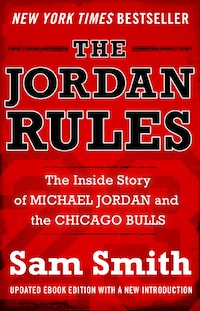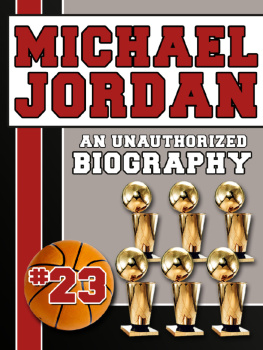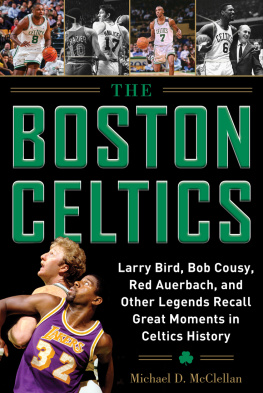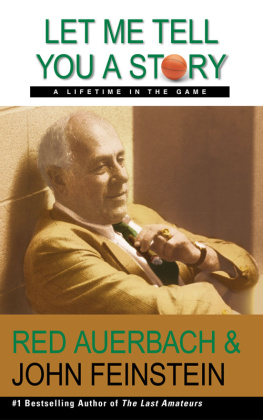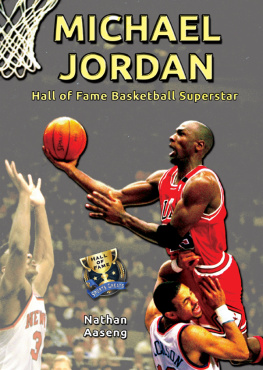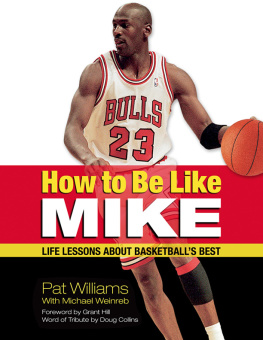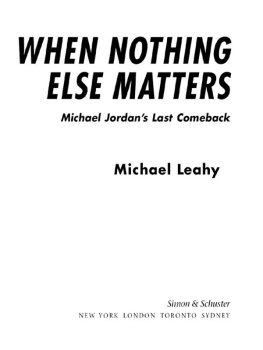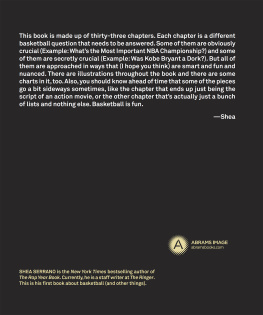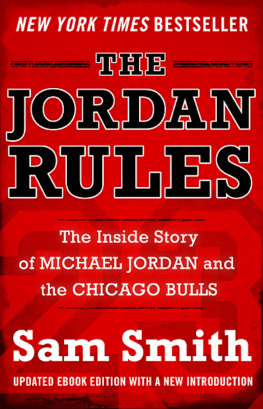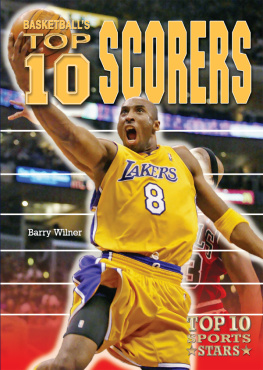Authors Note
There is no next.
Thats, in part, the message of this book. We love in life, and especially in sports, to make comparisons to the great ones. Another Washington or Lincoln or Churchill or Roosevelt. In basketball, we constantly chase this debate. The latest version follows LeBron James and whether hes the next Jordan. It had been Kobe Bryant and before him Grant Hill. Jordan was a next with Julius Erving and Shaq with Wilt. Its a shorthand way to make comparisons and create context. But the difference with Jordan, is there cannot be a next because Jordan is about much more than basketball. Thats why the comparisons feature more references with Babe Ruth or Muhammad Ali, transcendent figures who were about much more than their sport or the records they set within their sport. And likely Jordan surpasses them all.
Ruth effectively created modern Major League baseball; not only with his vast home run hitting skills but his influence on American society. That was an era of limited transportation and communications and Ruths influence was most felt in the eastern and mid-western United States. Alis era was more advanced. But he was a paradoxical figure, drawing intense amounts of respect and revulsion in his prime. Though its less the personal reaction with Jordan as the societal influence, Jordans impact crosses gender and race, economics and fashion. No American athleteeven three decades latercarries such a strong identity and has instituted so much change in his sport. And being somewhat reclusive has only enhanced his image. Its not only about the number of rings or championships or MVP awards or any of the statistical minutia that is so frequently mined these days to show extraordinary value for someone.
There is never going to be another Jordan also because of the time when he came along. Jordan arrived at the birth of international acceptance and embracement of the game, and thus was perhaps the most potent figure to emulate. His poster was on the walls in dozens of countries as well. Plus, Jordans time coming in 1984 was the effective rebirth and rebranding of the NBA. Jordan arrived at the crossroads of these events and contributed his unusual and special skills and abilities, which led to overwhelming and absolute success on a regular basis on the greatest of stages.
Its basically impossible to duplicate; for the league certainly never will be as vulnerable and lacking the commercial enterprises that sent it on a three decade acceleration. Jordan was the face of that and no one is likely to ever be in that position again. And then theyd also have to produce as Jordan did with record scoring except for Chamberlain, record titles except for Bill Russell, record individual defense and embrace from the sporting public like we havent seen since; not for Tiger Woods or LeBron James.
ESPN has become the preeminent authority for sports in America. They have an annual award ceremony and list a greatest athlete. Here are all their winners in the twenty-first century: Woods, Lance Armstrong, LaDainian Tomlinson, Michael Phelps, Drew Brees, Dirk Nowitzki, James and Kevin Durant. See any influence there to rival Jordans? Their best international athletes have been: Albert Pujols, Roger Federer, Lorena Ochoa, Lionel Messi, Usain Bolt, Cristiano Ronaldo. None likely match Jordans poster sales. Their female athletes of this century have been Ronda Rousey, Serena Williams, Brittney Griner, Lindsey Vonn, Nastia Liukin, Candace Parker, Taryne Mowatt, Annika Sorenstam, Diana Taurasi, Venus Williams, Marion Jones and Mia Hamm.
Who else can you bring up in the last hundred years? Pele? Jackie Robinson? Jim Brown? Wayne Gretzky? Sugar Ray Robinson? Jack Johnson? Ted Williams? Dale Earnhardt? Carl Lewis? Bruce Lee? Jim Thorpe? Bo Jackson? Willie Mays? Mike Tyson? Kareem Abdul-Jabbar? Bobby Orr? Nadia Comaneci? With a combination of success, popularity and influence, theres no one who seems even to come close to Jordan.
October 2014 will mark thirty years since Jordan debuted in the NBA. I want to thank those who gave generously of their time to discuss Jordan and his impact on them, the game, and the community.
In writing about the NBA for more than thirty years, the most enjoyment for me has been the people. I consider myself a better reporter than writer. I enjoy the reporting part so much more, which really is the essence of being a journalist. I basically read non-fiction as well. I always liked hearing a story or finding out a secret, and then being able to tell it as quickly as possible. One definition of journalism, as its been said, is literature in a hurry. So I decided to interview the people Ive known best during the last thirty years. I felt theyd be more relaxed and Id be less likely to get a formal interview since most are sports figures and have been interviewed hundreds of times. I did some of the interviews by telephone, as it was difficult to arrange all the meetings. But I did most face-to-face, and they usually lasted about thirty minutes. With many, they went on much longer. But I had long turned off the tape recorder to talk with old friends.
Thats one of the special parts of being a sportswriter. As kids, we wanted to be players. Most of us knew that was an impossible dream, but it was not impossible to see or occasionally meet your sporting favorites. I was thrilled as a kid to sit in the balcony in Madison Square Garden or in the grandstands at Ebbets Field and Yankee Stadium to watch Wilt, Oscar Robertson and Elgin Baylor, Mickey Mantle, Willie Mays, Duke Snider, Gil Hodges and Roger Maris, Frank Gifford and Y.A. Tittle. And then you get into sports and youre part of their world. Not one of the planets, but perhaps like satellites orbiting around and occasionally making a landing. Ive been able to spend considerable time not only with Jordan as the writer for the Chicago Tribune, but players like Larry Bird, Reggie Miller, Charles Barkley, Chris Mullin, Joe Dumars, Isiah Thomas, Magic Johnson and many others. You dont become a part of their worldand, in fact, when you are with them you are virtually invisible as people are so entranced by them they dont even remember you were therebut you see it for awhile and come to understand quickly most are decent, mostly unexceptional people with an exceptional skill. They are great entertainers, though more so in our society which views them as the version of Greek gods, who were admired and celebrated for their feats. These are less mythological, though often with myths that grow. I spent about a year working on this book with the interviewing taking most of the time around my work with Bulls.com. The writing was the difficult part for me, and like with most stories, I know Ill think of things I could have or should have said better or read something and wish I could have put it that way. But the interviewing was the most fun, spending time before or after games, on off days, at lunches or dinners with many of the greatest figures in the game and talking about the greatest player theyve known. Its been an education and a vacation.
Id like to offer a special thanks to President Barack Obama. Hes a great basketball fan, as we know, a Bulls fan, and knowledgeable about the game. I didnt want to involve the president in a commercial venture, as the office is too important to our country. I asked my longtime friend and former Tribune coworker David Axelrod, who was President Obamas campaign advisor and political advisor to the president, if the president would be willing to answer a few written questions about Jordans influence and effect on basketball and the culture. The president graciously agreed, and his answers were some of the most penetrating and revealing. He has an amazing knowledge of the game and a particular understanding of people and their impact. Also, my special thanks to David for his interview. Hes been a Bulls season ticket holder since the late 1970s and a heck of a playground player, even if I never told him that, all the times he was winning in our team games down in his Hyde Park neighborhood.

